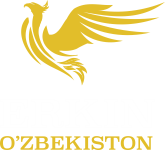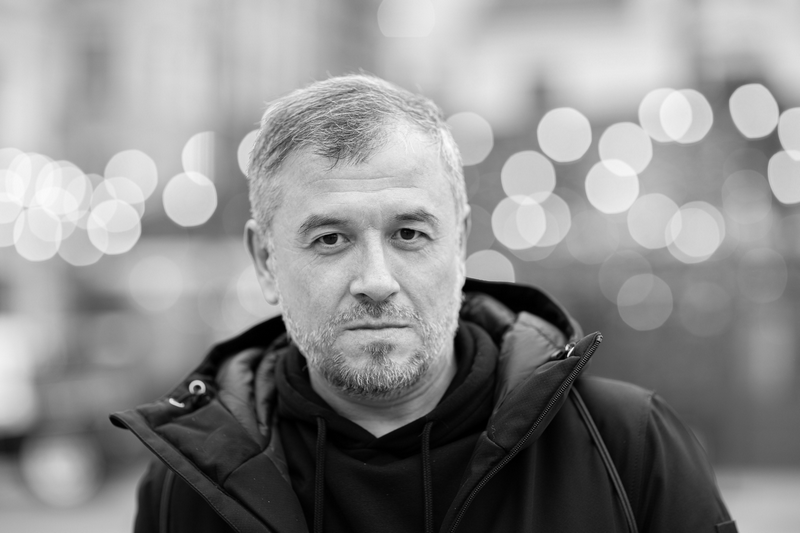
Public Activities and Initiation of Criminal Proceedings
On January 16, 2006, Hasanboy Burhanov was appointed director of the subsidiary “Tehnokomtrade” (hereinafter referred to as “the enterprise”) at the invitation of the leadership of the Uzbek Society of Disabled People.
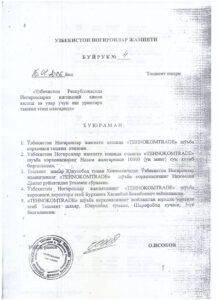
According to Article 1.1 of the Charter, the enterprise was established to operate on a self-sufficient and self-sustaining basis.
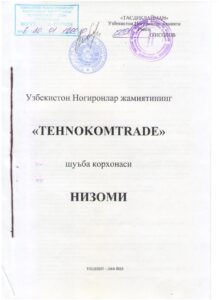
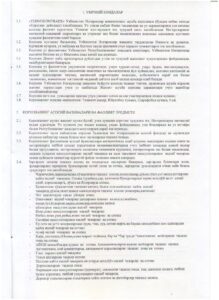
The legal status of the enterprise, based on Articles 1.4 and 3.1 of the Charter, is that of a legal entity.

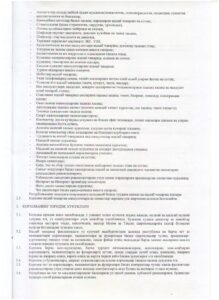
Article 4.1 of the Charter states that the profit generated from the enterprise’s activities, after deducting mandatory payments to the budget and to the founders, can be distributed at the discretion of the enterprise.
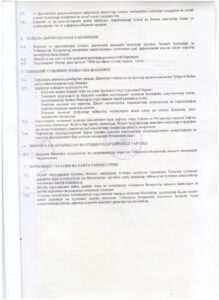
According to Clause 2.2 of the Contribution Agreement, which was concluded between the society and the subsidiary on August 1, 2006, the enterprise undertook to transfer 100,000 (one hundred thousand) sums to the founder on a monthly basis.
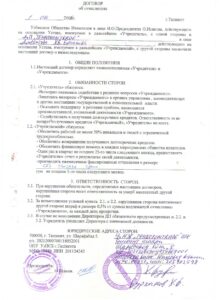
These were standard requirements applied at that time in the Uzbek Society of the Disabled system for newly established enterprises with a zero balance.
To promote awareness and draw attention to the needs and problems of people with disabilities, Burhanov issued membership (charity) stamps, which were planned to be distributed among the citizens of Uzbekistan. The idea was for each person who received a symbolic stamp to reflect on the individuals with disabilities living nearby, who, despite their physical characteristics, are equal members of society. Due to the financial impossibility of covering expenses from the enterprise’s account, which had a zero balance at the time, Burhanov paid for the production of the stamps out of his own personal funds.
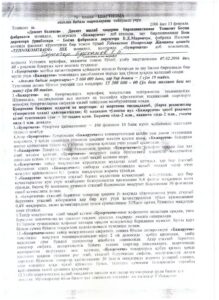
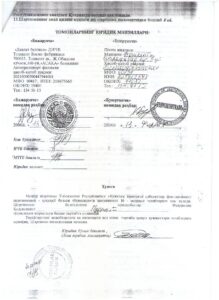
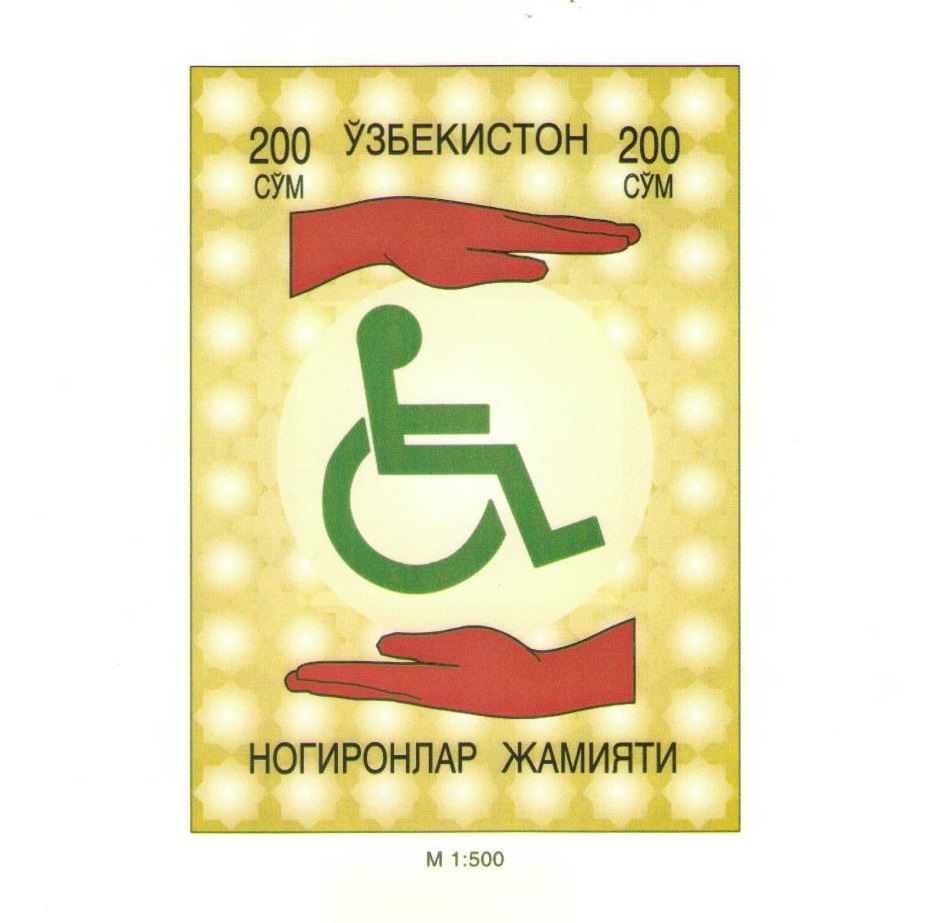
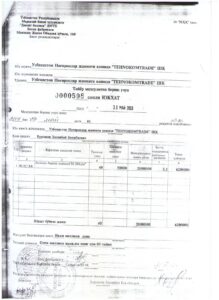
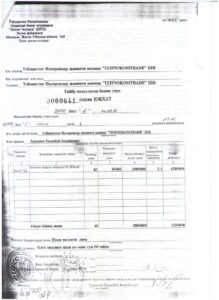
By implementing innovative methods, Burhanov was able to significantly improve the financial status of not only the enterprise but also the public organization in a short period. Using the enterprise’s funds, a new car was purchased for the needs of the Uzbek Society of Disabled People, contracts for the education of people with disabilities in higher education institutions were paid, and the treatment and utility bills of needy people with disabilities were covered.
After members of the public organization proposed that Burhanov create and head the Tashkent Society of the Disabled People, which by early 2008 had structural units in seven districts of the capital, the founder considered it advisable to close the enterprise and issued an order for the voluntary liquidation of the subsidiary “Tehnokomtrade”.
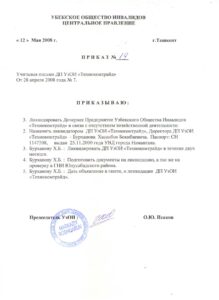
Following the necessary state inspections, the Yunusabad District Tax Inspectorate informed the registering authority that, according to the liquidation act, the enterprise as of July 30, 2008, had no debt to the budget.
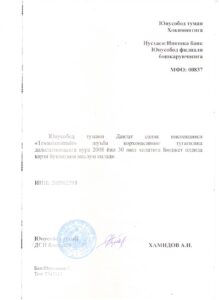
On August 4, 2008, in Letter No. 8523, the Entrepreneurship Registration Inspection of the Yunusabad District Khokimiyat in Tashkent notified the relevant state authorities about the removal of the subsidiary “Tehnokomtrade” from the state register.
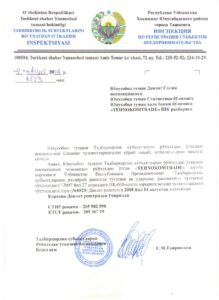
Burhanov’s social activities began to take on a political dimension, and his anti-corruption investigations started to pose a threat to high-ranking officials in Uzbekistan. Corrupt government officials were using the public organization to embezzle large international grants and engage in illegal human trafficking to the USA and EU countries. Burhanov repeatedly warned the leader of the Uzbek Society of Disabled People, Isakov, that his activities constituted a serious criminal offense and needed to be stopped immediately. However, Isakov ignored his colleague’s warnings.
On September 25, 2008, Burhanov initiated an investigation against Oybek Isakov by filing a complaint with Uzbekistan’s law enforcement agencies about the alleged crimes.
When Isakov and his accomplice were caught accepting a bribe through extortion, they were detained by operatives from the National Security Service (renamed the State Security Service of the Republic of Uzbekistan on March 14, 2018) and the Department for Combating Economic Crimes under the General Prosecutor’s Office of the Republic of Uzbekistan.
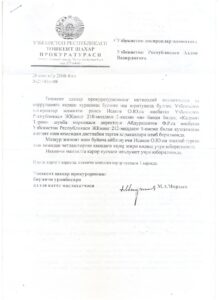
Criminal proceedings were initiated against Oybek Isakov, and he was convicted by the Tashkent City Criminal Court under the following articles of the Criminal Code of Uzbekistan: Article 167, Part 3, Clause “a” (embezzlement or misappropriation), Article 205, Part 2, Clauses “a” and “b” (abuse of power or official authority), Article 207, Part 1 (official negligence), Article 209, Part 2, Clause “a” (official forgery), and Article 210, Part 3, Clause “b” (receiving a bribe). However, Isakov’s corrupt connections allowed him to avoid actual imprisonment, and he received a suspended sentence.
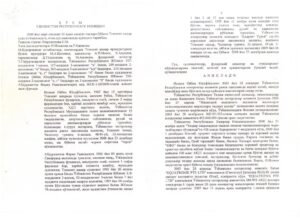
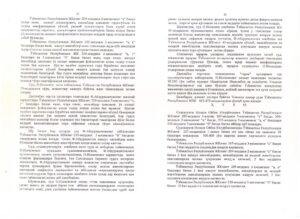
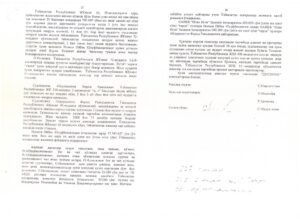
Initiation of Criminal Case against Hasanboy Burhanov
Due to Burhanov’s social activities, civic stance, and fight against corruption in the social sphere, the Uzbek authorities organized a legal investigation against him. By instigating defamatory statements from previously convicted individuals, the Uzbek law enforcement agencies initiated a criminal case against Burhanov in early 2009.
Preliminary Investigation
The first part of the accusation, according to investigator Khusanov who handled the case, was that Burhanov had purchased bedding sets for the needs of the disabled at inflated prices while serving as the director of the enterprise. The second part of the accusation was based on the claim that Burhanov had failed to collect the receivables for the distributed stamps in a timely manner.
To substantiate his accusation, on March 25, 2009, investigator Khusanov sent a letter to the director of “Chilonzor Savdo Markazi” LLC, Sh. Said-Gaziev. In the letter, Khusanov stated: “…a criminal case has been initiated against the officials of ‘Tehnokomtrade’ and the Tashkent City Branch of the Uzbek Society of Disabled People under Articles 167, Part 3, Clause ‘a’ and 205, Part 2, Clause ‘a’ of the Criminal Code of the Republic of Uzbekistan. During the preliminary investigation, it was established that in 2007, ‘Tehnokomtrade’ sold bedding sets to public organizations of the disabled. In this regard, we request that you evaluate the presented bedding set at 2007 prices…”.
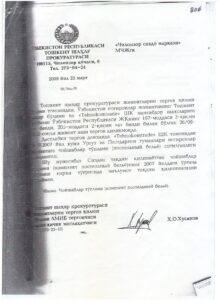
This letter from investigator Khusanov is clear evidence that he initially falsified Burhanov’s case, conducted it in a biased manner, and with a prosecutorial bias. One only needs to carefully read the letter and compare it with the facts:
– The investigator’s letter states: “…a criminal case has been initiated against the officials…”. In reality, the criminal case was initiated only against Burhanov and not under Article 205, Part 2, Clause “a” (abuse of power or official authority), but under Article 207, Part 1 (official negligence).
– In his letter, Khusanov mentions that during the investigation, it was revealed that “Tehnokomtrade” sold bedding sets to public organizations of the disabled. In reality, based on the request for assistance, the enterprise DONATED the bedding sets to public organizations for their free distribution to needy disabled persons.
– The letter from the investigator is dated March 25, 2009, and includes a bedding set for evaluation. However, according to the investigation documents, the protocol for the seizure of items (bedding set) for inclusion in the criminal case was conducted on April 15, 2009. The inspection protocol of the seized items was drawn up on June 3, 2009.
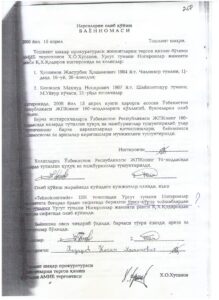
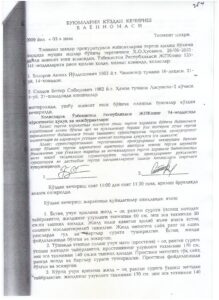
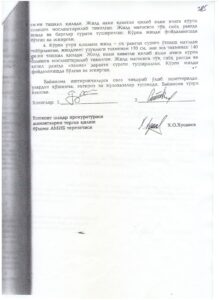
and the decision to include the items in the criminal case as physical evidence was made on June 3, 2009
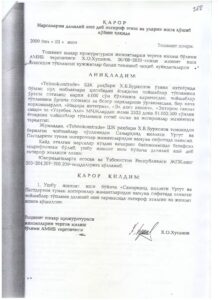
meaning that investigator Khusanov began the evaluation even before obtaining the necessary evidence sample.
n March 25, 2009, the director of “Chilonzor Savdo Markazi” LLC, Sh. Said-Gaziev, sent response No. 05/7-4 to the Tashkent City Prosecutor’s Office, stating that “in response to your request for an evaluation of the attached bedding set, we inform you that in 2007 the cost of this product was 3600-4000 sums”.
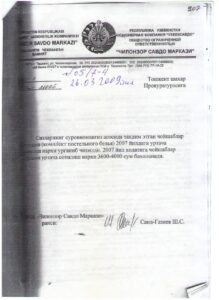
This response to investigator Khusanov’s letter became the main evidence for accusing Burhanov in this criminal case.
It is worth noting that Tashkent prosecutor investigator Khusan Khusanov and the director of “Chilonzor Savdo Markazi” LLC, Sh. Said-Gaziev, are close relatives. Sh. Said-Gaziev is the father-in-law of investigator Khusan Khusanov.
In the report compiled by investigator Khusanov on June 1, 2009, a biased assessment of the facts can also be observed. The investigator writes that 12.4 million sums were spent on the production of stamps, and the funds collected from their distribution amounted to about 123.3 million sums.
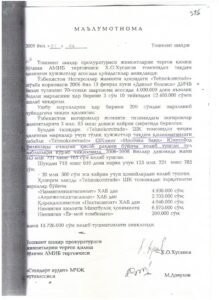
The investigator does not mention in the document that the stamps were produced at Burhanov’s personal expense. This detail would have portrayed the enterprise’s director in a positive light, highlighting his moral qualities.
Furthermore, Khusanov mentions that during the investigation, he was not provided with the expense documents of “Tehnokomtrade”.

The Investigator Distorts Facts Again
Investigator Khusanov had been informed by the appropriate notification document.
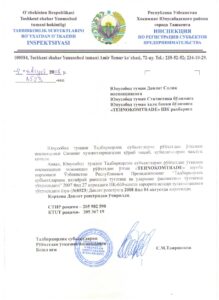
that the enterprise had been removed from the state register on August 4, 2008.
According to regulations, after the liquidation of any enterprise, all its documents are transferred to the state archive. This is why Burhanov could not have had the enterprise’s documents in his possession; investigator Khusanov received them, as expected, from the state archive but decided to omit this fact.
A separate issue arises from the lack of investigation into other officials from government bodies involved in the liquidation process of “Tehnokomtrade.” Investigator Khusanov’s claims regarding the enterprise’s activities were directed solely at Burhanov.
Khusanov also ignored the fact that, according to Articles 1.4 and 3.1 of the Charter, the enterprise is a legal entity entitled to independently distribute and expend the funds obtained from its activities. According to the Contribution Agreement concluded between the parties on August 1, 2006, at the time of liquidation, the enterprise had fulfilled its obligations in full, and the founder had never had any claims against it.
Khusanov also intentionally overlooked Article 1.6 of the enterprise’s Charter, which clearly states that the enterprise is not liable for the obligations of the society (founder), and the society (founder) is not liable for the obligations of the enterprise
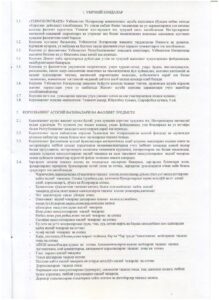
In the criminal case materials, investigator Khusanov deliberately omitted the above important details, as they would have clearly demonstrated Burhanov’s innocence.
On June 3, 2009, the investigator issued a Decision to attach physical evidence to the criminal case. This document was also falsified. In this Decision, the investigator stated that “…the bedding sets were taken as samples from two public organizations of the disabled, as evidenced by the Protocols of Seizure of Items and the Protocol of Inspection of Seized Items…”.
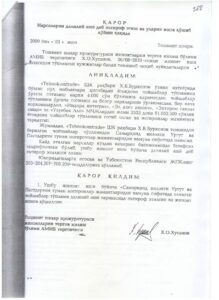
In reality, investigator Khusanov prepared the Protocols of Seizure and Inspection of Items for only one public organization (this fact was later pointed out by the judge during the trial).
On June 4, 2009, investigator Khusanov issued a Decision to involve Burhanov as a defendant in the investigated criminal case under Articles 207, Part 1, and 167, Part 3, Clause “a” of the Criminal Code of Uzbekistan. When signing this document, Burhanov added by hand: “I absolutely disagree with the charges brought against me”.
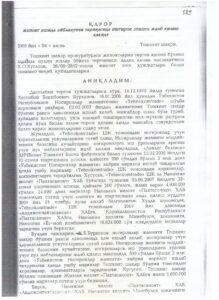
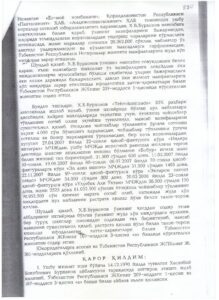
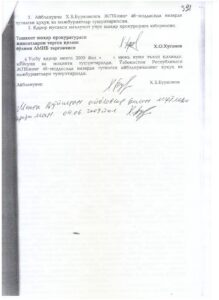
Based on all the above documents, on June 22, 2009, investigator Khusanov issued an indictment against Burhanov and sent the case to the Yunusabad District Criminal Court in Tashkent.
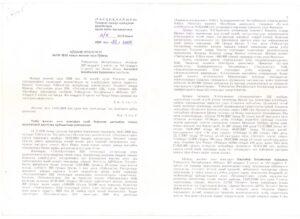
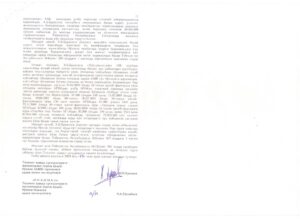
Criminal Proceedings
During the trial, Judge A. Turabov paid attention to all inconsistencies and falsifications that investigator Khusanov committed during the preliminary investigation. Specifically:
1. On August 4, 2008, “Tehnokomtrade” was removed from the state register. During the liquidation process, state authorities did not identify any debts to the budget or other organizations.
2. According to the Presidential Decree of the Republic of Uzbekistan PF-1154 dated May 12, 1995, and the Law “On Securities and the Stock Exchange” (amended to the Law “On the Securities Market”), the produced stamps are not securities, so the non-returned amount of 20.362 million sums from distributed stamps cannot be considered overdue receivables.
3. The samples of bedding sets from public organizations were obtained through systematic pressure from the investigation. Moreover, the samples attached to the case did not match the documented characteristics. This is a gross violation of the requirements of the Criminal Procedure Code of Uzbekistan.
4. Investigator Khusanov, without yet receiving the bedding sets and without preparing the Protocols of Seizure and Inspection of Items, sent a letter on March 25, 2009, to the shopping center for their evaluation and arbitrarily established the needed price.
5. The investigator accuses Burhanov of embezzling 70.952 million sums without sufficient necessary evidence, solely based on the written response from the shopping center director.
6. According to an official letter from the Uzbek Society of Disabled People.
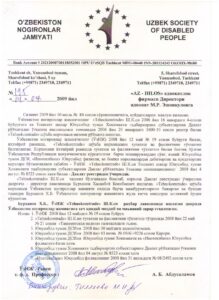
and the oral testimony of its representative in court, Burhanov did not cause any damage to the organization; the society has no material or moral claims against the accused.
After three hearings, on September 10, 2009, Judge A. Turabov issued a Court Decision to send Burhanov’s case to the Tashkent City Prosecutor’s Office for additional investigative actions.
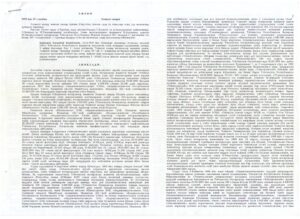
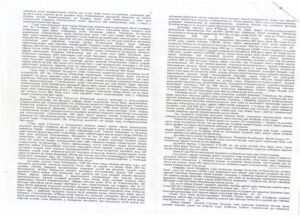
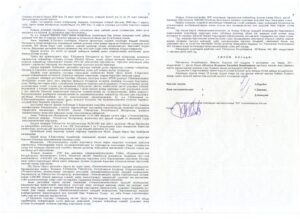
On the same date, addressing the Tashkent City Prosecutor, Judge A. Turabov issued a Private Ruling recommending a comprehensive review of the case’s shortcomings and taking appropriate measures against those responsible for errors during the investigation.
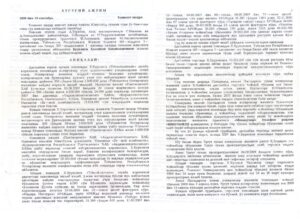
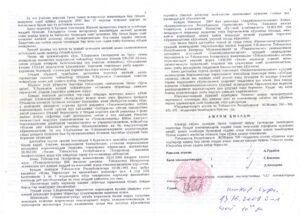
Prosecutor’s Actions and Further Legal Proceedings
On September 20, 2009, Yunusabad District Prosecutor I.K. Kazakbaev filed a Private Protest (No. 12/09) with the appellate instance of the Tashkent City Criminal Court. On October 13, 2009, a decision was issued to leave the first-instance court’s decision unchanged.
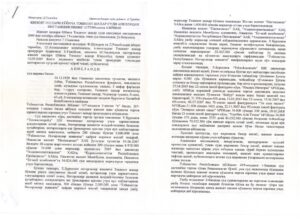
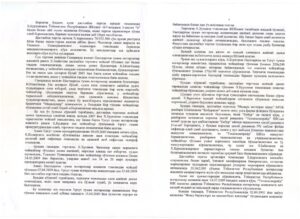

A month later, following the personal intervention of Tashkent Prosecutor Bakhriddin Valiev (currently the First Deputy Prosecutor General of Uzbekistan), a Private Protest under No. 12/13-09 was filed in the Supervisory Board of the Tashkent City Criminal Court. Valiev requested the Supervisory Board to annul the decisions of the Yunusabad District Criminal Court and the appellate instance of the Tashkent City Criminal Court, sending Burhanov’s case for reconsideration by the same court but with a new panel.
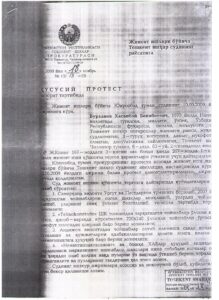
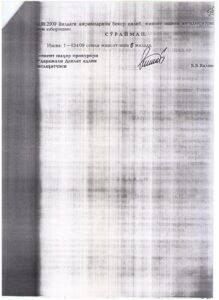
Red-tapism in the Courtrooms
On November 25, 2009, the Supervisory Board of the Tashkent City Criminal Court, chaired by Sh. Gaziev, made a Decision (No. 3r-159/09) to satisfy the Tashkent Prosecutor’s protest, annul the lower court’s decisions, and return Burhanov’s case for reconsideration by the same court with a new panel.
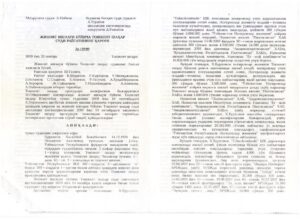
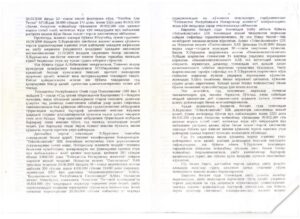
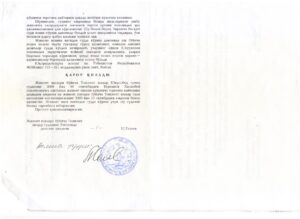
On January 21, 2010, the Yunusabad District Criminal Court of Tashkent, presided over by Judge R. Bakiyeva, found Burhanov guilty under Articles 167, Part 3, Clause “a” and 207, Part 1 of the Criminal Code of Uzbekistan, ordering him to pay 92,246,000 sum to the state.
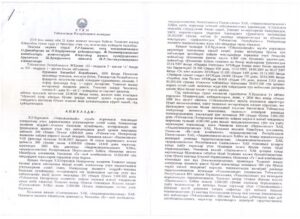
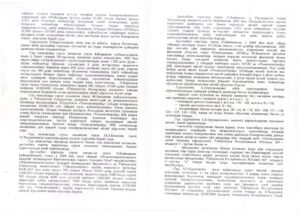
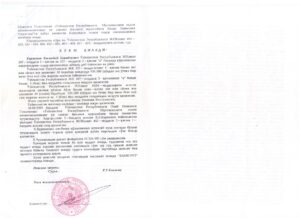
The attributed accounts receivable of 20,362,000 sum and the “embezzled” amount of 70,952,500 sum were awarded to the state by Judge R. Bakiyeva. The rationale behind this decision is unclear, given that by the time of the verdict, 8,349,000 sum of the so-called “accounts receivable” had already been deposited into the account of the Society of the Disabled People.
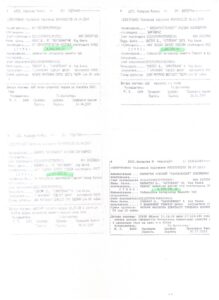
Despite presenting these facts and bank statements, neither judges nor prosecutors paid attention to these details.
On February 19, 2010, the appellate instance of the Tashkent City Criminal Court upheld Judge R. Bakiyeva’s verdict without changes.
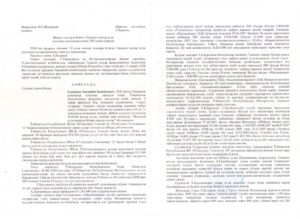
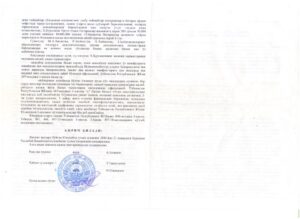
It is noteworthy that both Judge R. Bakiyeva and the appellate panel referred to a so-called “face-to-face protocol,” which had never been conducted either during the preliminary investigation or the first trial.
On April 23, 2010, Tashkent Prosecutor Bakhriddin Valiev filed another protest (No. 12/13-10) with the Supervisory Board of the Tashkent City Criminal Court, arguing for the need to apply Article 45 of the Criminal Code of Uzbekistan (Deprivation of the Right to Hold Certain Positions) to Burhanov by the first-instance court. Valiev requested the Supervisory Board to annul Judge R. Bakiyeva’s verdict of January 21, 2010, and send Burhanov’s case for reconsideration by the same court with a new panel.

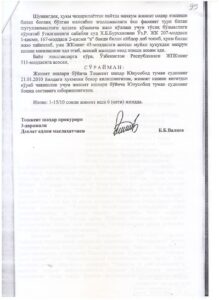
On May 12, 2010, the Supervisory Board of the Tashkent City Criminal Court, chaired by Sh. Gaziev, once again satisfied the capital prosecutor Valiev’s protest in full.
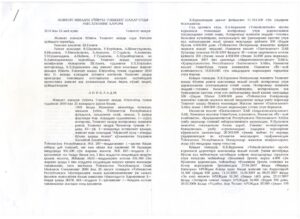
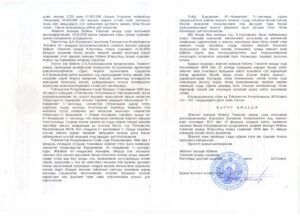
Tired of the long humiliating processes, Burhanov wrote a statement to Judge A. Saidov, refusing the services of a lawyer and intending to defend his rights independently.
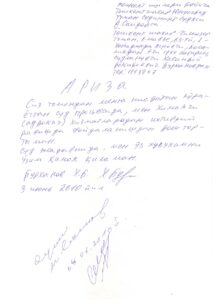
On July 13, 2010, Yunusabad District Criminal Court Judge A. Saidov, taking into account all the remarks of the city prosecutor, found Burhanov guilty and issued a guilty verdict.
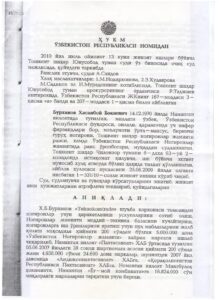

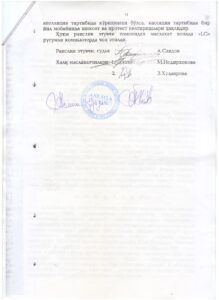
The court applied Article 45 of the Criminal Code of Uzbekistan to Burhanov and ordered him to pay 92,246,000 sum to the state (corresponding to 20,362,000 sum of “accounts receivable” and 70,952,500 sum of “embezzled” funds).
Arguing that the court session protocol and Judge A. Saidov’s verdict were not signed, on July 22, 2010, Yunusabad District Prosecutor I. Kazakbaev filed a Protest with the appellate instance of the Tashkent City Criminal Court.
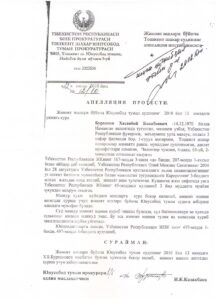
On August 20, 2010, the first-instance verdict was annulled once again, and Burhanov’s case was sent back to the same court for reconsideration by a new panel.
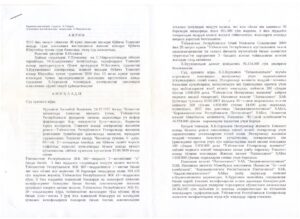
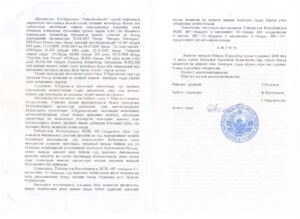
Burhanov’s legal proceedings began to resemble a farce, and looking at the last page of Judge A. Saidov’s verdict, one could see the signatures of all the participants in this farce.
In September 2010, Burhanov’s trial began anew with the fourth panel, chaired by Judge M. Akhmedov. To ensure an accurate assessment of the facts, Burhanov filed a petition in court to establish whether the stamps he had issued were securities and if they had any material value. Judge M. Akhmedov rejected Burhanov’s petition, arguing that such an examination would not be relevant to the case.

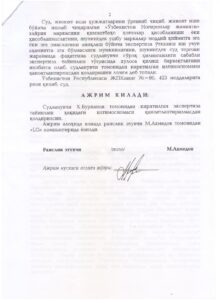
Despite the chairman of the Uzbek Society of Disabled People, Professor A. Abdusalamov, informing the court on October 12, 2010, that the organization had no claims against Burhanov.
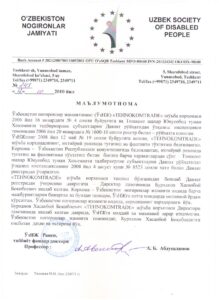
On October 15, 2010, Judge M. Akhmedov found Burhanov guilty and issued a guilty verdict. Unlike previous judges, Judge Akhmedov ruled that Burhanov should pay 91,314,500 sum not to the state but to the Uzbek Society of Disabled People.
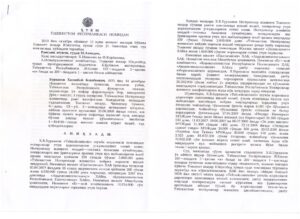
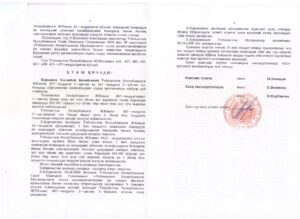
Judge Akhmedov, like the previous judges who issued guilty verdicts, ignored the fact that 13,287,000 sum of the so-called “accounts receivable” had already been deposited into the Society of the Disabled’s account. This fact was completely ignored by the Uzbek judicial system during the consideration of Burhanov’s case, demonstrating its bias against him.
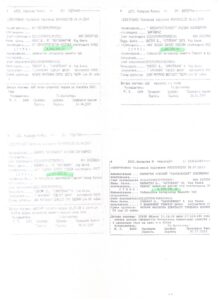
On December 2, 2010, the appellate instance of the City Criminal Court upheld the first-instance verdict without changes.

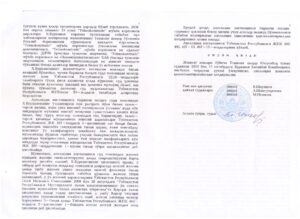
Based on a protest from the Deputy Prosecutor General of Uzbekistan, on February 10, 2011, the Criminal Panel of the Supreme Court of the Republic of Uzbekistan decided to annul Judge Akhmedov’s verdict of October 15, 2010, and the appellate instance decision (No. 1499) regarding Burhanov.
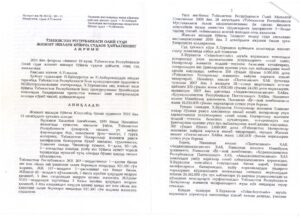
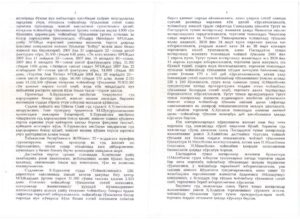
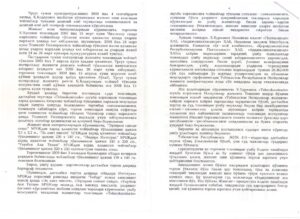
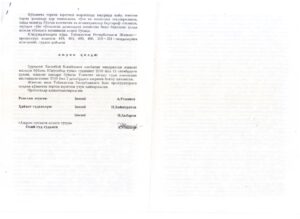
The court decided to return Burhanov’s case to the General Prosecutor’s Office for further investigation.
In April 2011, the Uzbek Society of Disabled People sent two documents to the Tashkent Prosecutor’s Office. The first document detailed that the organization had not suffered any damage from the actions for which Burhanov was accused.
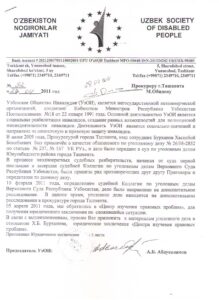
The second document was a legal opinion on Burhanov’s case prepared by the Center for Legal Studies of Tashkent.
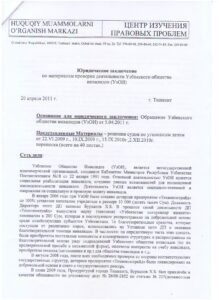
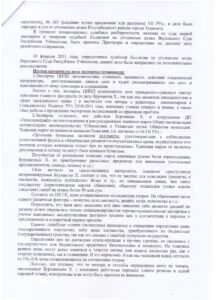
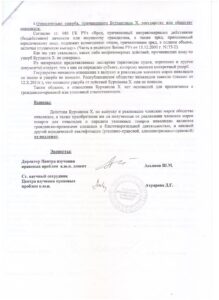
Instead of considering these documents, the leadership of the capital’s prosecutor’s office resorted to open threats against Burhanov. During one of the many hours of interrogation at the Tashkent City Prosecutor’s Office, where Burhanov was summoned again for investigative measures, investigators Tadzhibaev, Khusanov, and several other officers, through blackmail and threats of physical violence, forced Burhanov to sign a document reclassifying the charges and applying an act of amnesty to him. They could not allow Burhanov to be rehabilitated, as this would threaten the leadership of the Tashkent prosecutor’s office with service checks and subsequent criminal cases against them.
Based on this document, investigator Tadzhibaev reclassified Article 167, Part 3, Clause “a” to Article 205, Part 2, Clauses “a” and “b” (abuse of power or official authority), while leaving Article 207, Part 1 (official negligence) unchanged. On June 6, 2011, the fifth panel of the Yunusabad District Criminal Court, chaired by Judge R. Juraev, issued a Decision to cease criminal proceedings against Burhanov based on Article 7 of the Resolution of the Senate of the Oliy Majlis of Uzbekistan “On Amnesty in Connection with the 19th Anniversary of the Proclamation of Independence of the Republic of Uzbekistan”.

Civil Proceedings
On October 17, 2011, Yunusabad District Prosecutor I. Kazakbaev filed a Civil Claim No. 1220a-11 with the Mirzo-Ulugbek Interdistrict Civil Court to recover damages caused by the crime. In the claim, Prosecutor I. Kazakbaev requested the court to order Burhanov to pay 91,314,500 sum to the Uzbek Society of Disabled People, as well as court costs and state duties.
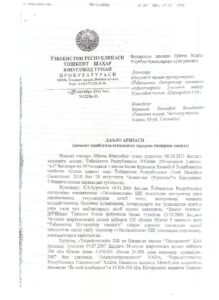
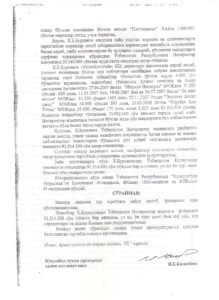
On February 3 and March 14, 2012, the Uzbek Society of Disabled People once again informed the court in writing of Burhanov’s innocence.
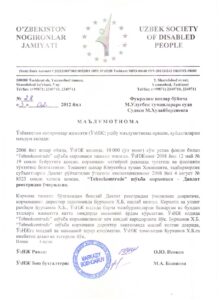
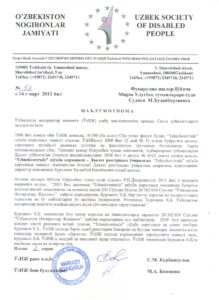
Despite the complete lack of evidence, on April 23, 2012, Judge M. Khudayberdiev issued a Decision to recover 91,314,500 sum from Burhanov in favor of the Uzbek Society of Disabled People, as well as 18,262,900 sum (20% of the recoverable amount) as a state duty to the state.
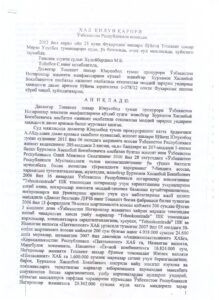
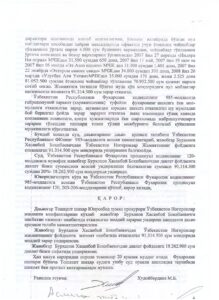
On June 25, 2012, the new Yunusabad District Prosecutor Sh. Akbarov filed Cassation Protest No. 14/12 with the cassation instance of the Tashkent City Civil Court, requesting the court to amend Judge M. Khudayberdiev’s decision and recover 59,147,265 sum from the defendant Burhanov.
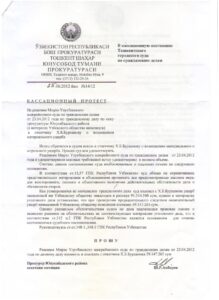
The first session of the Cassation Instance of the Tashkent City Civil Court was scheduled for August 10, 2012. Burhanov invited human rights defenders and observers from the US and UK embassies to this court. Due to the absence of the representative of the Uzbek Society of Disabled People, who had previously attended all the trials, the session was postponed to August 21, 2012.
The next court session, attended by observers from the US and UK embassies, ended quickly as Prosecutor Bazarova was unable to provide the necessary documents proving that Burhanov had caused material damage to the Uzbek Society of Disabled People in the amount of 59,147,265 sum.
On August 28, 2012, before the start of the court session, which was attended by observers from the diplomatic corps, journalists, civil activists, and human rights defenders, the representative of the Uzbek Society of Disabled People staged a provocation, disrupting the court session.
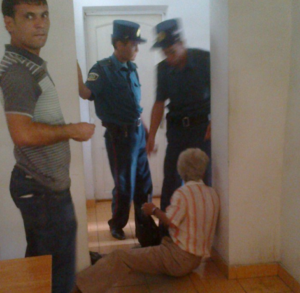
After this incident, the hearing was postponed several times, and finally, on October 30, 2012, Judge Sh.N. Rajabova issued Decision No. 4-631/12 to satisfy Prosecutor Sh. Akbarov’s Cassation Protest, ordering Burhanov to pay 59,147,265 sum to the Uzbek Society of Disabled People, as well as 11,829,453 sum (20% of the recoverable amount) as a state duty to the state.
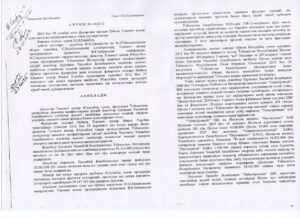
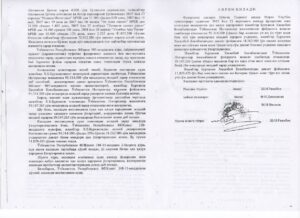
Burhanov was no longer present at this court session, as after numerous threats, beatings, and warnings of physical violence, he was forced to leave Uzbekistan.
Public Resonance and Observers’ Opinion
Burhanov’s trial lasted more than 3.5 years and gained widespread public attention.
Observers of the trial unanimously agreed that Burhanov’s criminal prosecution was fabricated and politically motivated.
In the 2012 Human Rights and Democracy Report of the UK Foreign and Commonwealth Office, it was stated: “Former head of the Uzbekistan’s Public Fund for Disabled People, Hasanboy Burhanov, is accused of corruption. The UK and other countries have serious concerns about the credibility of the charges and the transparency of the judicial process, which has been postponed five times this quarter”.
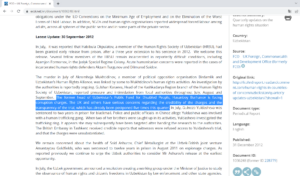
Hasanboy Burhanov’s name is also mentioned in the US State Department’s 2012 Human Rights Report.
Burhanov himself noted that the most challenging part of these processes was reaching the courtrooms of various instances, as none of the judicial buildings in Uzbekistan (criminal or civil) were accessible for people with disabilities.
Burhanov intends to seek full exoneration and to recover material and moral damages from the Uzbek authorities for the suffering caused.

